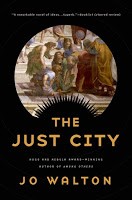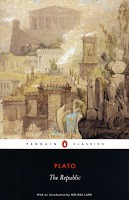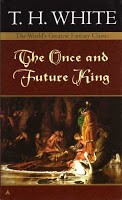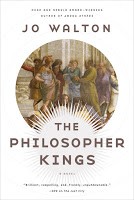 Do you ever long for the halcyon days of your bygone Liberal Arts degree? Would you rather have a Symposium than a party? Do the words “Plato fanfiction” perk your attention? If you answered yes to any of those questions, then The Just City is the book for you. In Jo Walton’s unique work of speculative fantasy, Platonists throughout history come together on an unknown Mediterranean island. With the help of the goddess Athena, their goal is to enact and follow Plato’s Republic.
Do you ever long for the halcyon days of your bygone Liberal Arts degree? Would you rather have a Symposium than a party? Do the words “Plato fanfiction” perk your attention? If you answered yes to any of those questions, then The Just City is the book for you. In Jo Walton’s unique work of speculative fantasy, Platonists throughout history come together on an unknown Mediterranean island. With the help of the goddess Athena, their goal is to enact and follow Plato’s Republic.
 The Just City is told through three equally compelling perspectives. First, the god Apollo decides on a whim to temporarily give up his power to become a resident of the City. After the nymph Daphne turns into a tree to escape his advances, Apollo decides that only by becoming human can he truly answer his questions about desire and equal significance. Simmea, the second narrator, comes to the City as a 10-year-old child; she was rescued from the slavers who captured her and killed her family, but she wonders that if by seeking to buy children from the slave markets, City denizens inadvertently created the demand. Finally, Maia grows up in Victorian England, where as a woman, her options for education and opportunity are severely limited. After reading Plato, who seemed to alone place men and women as equals in their philosophical capacities, she prays to Athena that she could live in his Republic.
The Just City is told through three equally compelling perspectives. First, the god Apollo decides on a whim to temporarily give up his power to become a resident of the City. After the nymph Daphne turns into a tree to escape his advances, Apollo decides that only by becoming human can he truly answer his questions about desire and equal significance. Simmea, the second narrator, comes to the City as a 10-year-old child; she was rescued from the slavers who captured her and killed her family, but she wonders that if by seeking to buy children from the slave markets, City denizens inadvertently created the demand. Finally, Maia grows up in Victorian England, where as a woman, her options for education and opportunity are severely limited. After reading Plato, who seemed to alone place men and women as equals in their philosophical capacities, she prays to Athena that she could live in his Republic.
 Walton engages with Plato both critically and gleefully, as she examines the humorous logistics of constructing his ideal city. As is clear to any reader of her works, Walton is a passionate and knowledgeable bibliophile; her pokes and jabs at the Republic seem to come from a place of love and longtime fandom. Her most intriguing trick is to use Plato’s ideas of the Just City to advance her own picture of justice, which itself is very wrapped up in Apollo’s questions about consent and equal significance. When Socrates shows up in the flesh and starts interrogating the citizenry, the question ultimately becomes not whether the City is Just but whether it should be a City at all.
Walton engages with Plato both critically and gleefully, as she examines the humorous logistics of constructing his ideal city. As is clear to any reader of her works, Walton is a passionate and knowledgeable bibliophile; her pokes and jabs at the Republic seem to come from a place of love and longtime fandom. Her most intriguing trick is to use Plato’s ideas of the Just City to advance her own picture of justice, which itself is very wrapped up in Apollo’s questions about consent and equal significance. When Socrates shows up in the flesh and starts interrogating the citizenry, the question ultimately becomes not whether the City is Just but whether it should be a City at all.
 If you’d like to read more overtly philosophical fiction, try T. H. White’s take on the Arthurian legend, The Once and Future King. In particular, The Book of Merlyn engages White’s post-war anarchist sympathies to ask if “might makes right” and what the alternatives could be. And make sure to check out Walton’s other work; The Philosopher Kings is the sequel to The Just City, and Necessity, the third book in the series, comes out in July.
If you’d like to read more overtly philosophical fiction, try T. H. White’s take on the Arthurian legend, The Once and Future King. In particular, The Book of Merlyn engages White’s post-war anarchist sympathies to ask if “might makes right” and what the alternatives could be. And make sure to check out Walton’s other work; The Philosopher Kings is the sequel to The Just City, and Necessity, the third book in the series, comes out in July.



